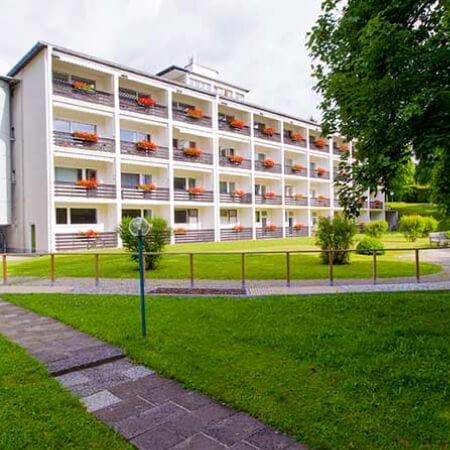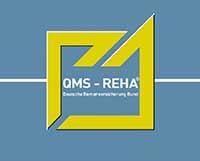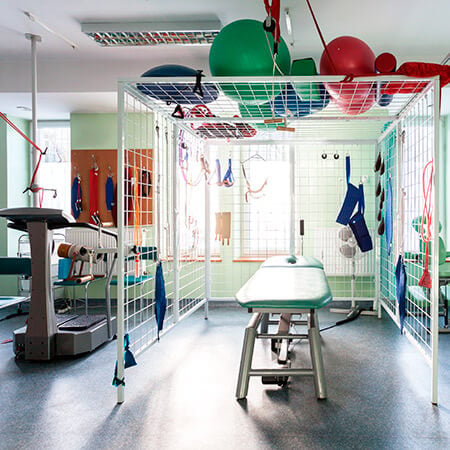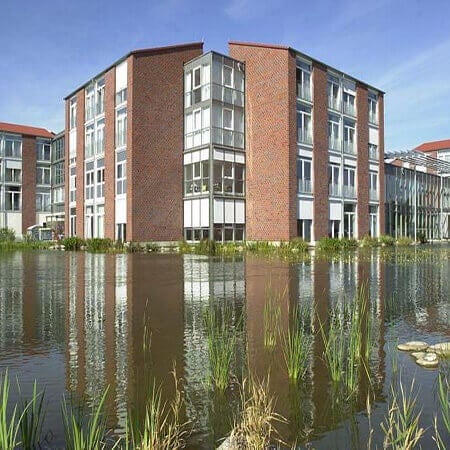Most patients require rehabilitation after severe neurological diseases, trauma or neurosurgical interventions. Ideally, rehabilitation is aimed at the complete restoration of all disturbed brain functions. If this is impossible, the functions are partially restored. For patients’ rehabilitation, doctors in Germany use innovative technologies. As a result of rehabilitation therapy, most patients, even with severe diseases, gain their independence in everyday life back. Many patients can also get back to work.
Content
- Who May Need Neurorehabilitation
- Principles of Rehabilitation
- How Are Brain Functions Restored?
- Rehabilitation After A Stroke
- Recovery of Motor Functions
- Accompanying Therapy
- Why is it Worth Undergoing Rehabilitation in a Hospital in Germany
- Rehabilitation in Germany with Booking Health
Neurological rehabilitation is a complex of measures aimed at improving the condition of people with disorders of the nervous system.
Neuro rehab is indicated to people with stroke, meningitis, spinal cord injuries, brain or spinal cord tumors, muscular dystrophy, multiple sclerosis, Parkinson and Alzheimer disease, etc.
The best clinics for neurological rehabilitation in Germany are Rehabilitation Clinic Benedictus Krankenhaus Feldafing, Neurological Rehabilitation Clinic Godeshöhe Bonn, St. Mauritius Therapieklinik Meerbusch. You can find other hospitals on the Booking Health website.
Who May Need Neurorehabilitation
Rehabilitation in neurology is used in patients who, for one reason or another, have suffered certain impairments in the functions of the central nervous system: spinal cord, brain, peripheral nerves. The causes may be from the following:
- Brain diseases – stroke, Parkinson's disease, etc.
- Previous surgical interventions – for example, surgery to remove a hematoma, a brain tumour.
- Trauma – traumatic brain injuries or spinal injuries.
Here are some symptoms, in the presence of which a patient may need rehabilitation:
- Chronic pain.
- Speech, vision, swallowing, counting, writing disorders, etc.
- Cognitive impairment.
- Poor coordination, inability to maintain balance.
- Severe muscle weakness or complete lack of control over certain muscle groups.
- Impossibility of performing elementary everyday tasks.
With regards to practised medicine in the 20th century, minimum attention was paid to the rehabilitation of patients. After being discharged from a department of neurology, patients returned home, where they were looked after by relatives. Most patients who had suffered a stroke or a severe trauma, remained disabled.
Nonetheless, in the 21st century, everything changed. Now, medicine pays great attention not only to the survival of patients but also to improving their quality of life. Rehabilitology is especially maximised in developed countries. However, there are not many rehabilitation clinics available in countries with low levels of economic development. Most patients in these countries do not undergo rehabilitation.
It is possible that rehabilitation medicine is also poorly developed in your own home country. If this is the case, you can visit one of the best hospitals for rehabilitation in Germany. In Germany, most patients will get good results. Just 2-3 months of rehabilitation is enough to restore the ability to self-care or return to an active social and professional life.
Rehabilitation goals are set individually. Before the recovery begins, German specialists carry out a diagnostic examination of the patient to determine his rehabilitation potential. During the course of rehabilitation, these goals can be adjusted, depending on the dynamics of restoration of the lost brain functions.
Principles of Rehabilitation
The principles of rehabilitation treatment in German clinics are:
Early start of rehabilitation activities. This helps to restore brain function faster, provides better long-term results for patients with movement disorders and reduces the risk of death. Early rehabilitation after a stroke is especially important. In German clinics, rehabilitation begins on the first day after the patient is admitted to the hospital, including in situations where the patient is not already in contact with the doctor.
Interdisciplinary interaction. In German hospitals, the neurorehabilitation of a patient is provided by a team of specialists. The team includes a rehabilitation therapist, a neurologist, a specialist in therapeutic exercises, a physiotherapist and, if necessary, a speech therapist-aphasiologist and a neuropsychologist. It has been proven that patient management by an interdisciplinary team, reduces disability and mortality in stroke patients by 30%.
Individual approach. In the best hospitals, rehabilitation programs are individually developed for patients, taking into account their rehabilitation potential and any impaired brain functions. The best possible treatment allows patients to regain self-care skills and return to an active life in the shortest possible timeframe. The program is constantly adjusted, taking into account the results achieved.
Social orientation. For patients undergoing neurorehabilitation, the necessary therapeutic measures are selected by taking into account the subsequent life. The doctors working in German hospitals strive to improve its quality, return the patient to society and give him the necessary skills not only for self-care but also for professional activities.
Stage-by-stage approach. Different procedures are used for neurological rehabilitation in different phases. In total, there are 7 phases in rehabilitation medicine in Europe. Most medical tourists travel to German clinics to undergo phase B or C of neurorehabilitation.
Phase B begins after discharge from the hospital and lasts about 1 month. It allows for maximising the restoration of the lost functions of the nervous system.
Phase C can last longer – up to 3 months. Upon its completion, a person receives functional results that are close to final. The patient not only restores mobility, speech and other functions but also adapts to neurological deficits and acquires the skills necessary for later life. In phase C, patients do not have to stay in the hospital permanently. If the state of their health permits, a person can live in a hotel and visit the rehabilitation clinic daily, as an outpatient for training and procedures.
Integrated approach. Doctors strive to restore all the lost functions at the same time. This significantly improves the results. Firstly because there is no wasted time, the principle of early neurorehabilitation is observed. Secondly, all centres are interconnected and therefore the development of some functions has a positive effect on the restoration of others. For example, even passive training of the patient's body can improve the cognitive functions of the brain, which has been repeatedly confirmed in studies.
How Are Brain Functions Restored?
After a stroke or any other neurological disease, brain function is affected by the death of nerve cells. The possibilities for their regeneration are limited. Brain centres are usually not fully restored. Despite this fact, those patients who undergo treatment in the hospitals which specialise in rehabilitation medicine and neurological rehabilitation, are making significant progress. This is possible thanks to several mechanisms:
- Some parts of the brain can take over the function of others.
- New connections are formed between neurons.
- Previously inactive neurons "wake up".
- Part of the cell is restored – the brain tissue is partially regenerated.
Even if some functions cannot be restored, during the process of rehabilitation a person adapts to his existing neurological deficit.
Rehabilitation After A Stroke
A stroke is the most common disease in which there is a need for neurological rehabilitation. According to the WHO, 6 million strokes occur annually in the world. 1.5-2 million out of these are fatal. The others will cause neurological deficits: in 80% of cases, movement disorders develop, in 60% of cases – cognitive impairments, in 20% of cases, speech functions are lost.
Disability not only worsens the quality of life but also shortens its duration. A person who does not move develops bedsores, blood clots, blood supply to their organs worsens and the cardiovascular system weakens. A person may suffer congestion in the lungs with the development of inflammatory processes. As a result, in countries with a poor quality of neurological rehabilitation, 50% of stroke survivors will die within the first year. Only 20% will return to their previous life – active and independent.
During the rehabilitation of stroke patients, doctors in Germany use the best possible therapies. These include:
- Therapeutic exercises.
- Training on special rehabilitation equipment.
- Physiotherapy.
- Botox injections.
- Speech therapy training.
- Verticalization.
- Psychotherapy.
- Occupational therapy.
The best clinics of neurology use state-of-the-art equipment. Patients work out on robotic training equipment. Biofeedback functions, virtual reality, peripheral stimulation and transcranial magnetic stimulation are all used.
Recovery of Motor Functions
In the 20th century, physical training was used to restore mobility. The patient just worked out in the gym using various equipment, under the guidance of an instructor. Now, this approach is still used but many other, more effective, methods have been developed too. They hone certain movements, increase patient motivation and improve balance, coordination and deep tissue sensitivity. These new methods require expensive equipment and therefore, they are mainly used in countries with a high level of economy.
The following types of training devices are used in Germany:
- Mechanical devices, including robotic ones. They act mechanically on certain parts of the human body, thereby restoring mobility. For example, they train hand motor skills.
- Unstable platforms. They train vertical stability and develop the vestibular system.
- Robotic suits. These can have many functions. They restore mobility due to mechanical, axial, power load and their application of anti-gravity action. Some suits can restore proprioceptive sensitivity.
- Hybrid training devices. These ones train several functions. They often use biofeedback and virtual reality.
Accompanying Therapy
Patients need drug treatment to improve their health, prevent the progression or repeated development of neurological diseases and create good conditions for recovery. After serious illnesses such as a stroke, many patients will need intensive care for the first few days.
Later on, patients receive medicines. Invasive medical procedures and surgical interventions can sometimes be used as well. For example, with an ischemic stroke, endovascular elimination of carotid artery stenosis may be required and with a hemorrhagic stroke, elimination of an aneurysm or removal of a brain hematoma may be required.
Most patients receive drug therapy. After a stroke, medication is used to correct blood pressure, cholesterol levels and to prevent thrombosis. Doctors also prescribe some medicines to improve metabolic processes in the brain. In some clinics, the regenerative potential of the nervous system is enhanced with the help of stem cells.
Why is it Worth Undergoing Rehabilitation in a Hospital in Germany
The best hospitals specialising in patient rehabilitation are located in countries with a high economic level. You can go to one of the German hospitals to receive quality therapy and rehabilitation. Below, you can see the benefits of rehabilitation treatment in a German hospital:
- State-of-the-art equipment: training devices, robotic systems, exoskeletons, biofeedback, virtual reality.
- Vast experience: there are 1,500 clinics in Germany involved in the rehabilitation of patients. This country is one of the world leaders in the number of rehabilitation centres per capita.
- Individual approach.
- Possibility to consistently go through all stages of rehabilitation, starting in the department of neurology, where the patient is being treated and ending at the rehabilitation centre.
- Comprehensive care.
- Comfortable conditions.
- High quality accompanying treatment. Drug therapy improves brain regeneration and reduces the risk of complications.
As a result of receiving rehabilitation in a German hospital, the patient will no longer need constant care from other people. This will improve the quality of life for not only the patient himself but also of his relatives. They will no longer have to constantly care for him or spend money on care.
After treatment and rehabilitation, the risk of repeated development or progression of the disease will decrease. The patient's level of activity will increase and therefore his life expectancy will increase as well. In the long term, the need for additional treatment will also decrease.
Rehabilitation in Germany with Booking Health
To undergo rehabilitation in one of the best neurorehabilitation centres in Germany, after suffering from a neurological disease, please use the services of Booking Health. On our website, you can find out the cost of the neurological rehabilitation in different clinics, compare prices and book a medical care program at a favourable price. When booking with us, your rehabilitation in Germany will be both easier and quicker and the cost of the program will be lower too.
Please leave your request on the Booking Health website. Our employees will contact you and advise you about neurological rehabilitation in Germany. Booking Health will take care of the organisation of your trip. We will provide the following benefits for you:
- We will choose the most suitable department of neurology and neurorehabilitation centre in Germany, whose doctors specialise in the rehabilitation treatment of patients after suffering neurological diseases.
- We will help you overcome the language barrier and establish communication with your attending physician at the hospital.
- We will reduce the waiting time for the start of the medical care program and make a doctor's appointment on the most suitable dates.
- We will reduce the price. The cost of therapy in the rehabilitation centre will be lower due to the lack of additional coefficients for foreign patients.
- We will take care of all organisational issues: documents for entering the country, transfer from the airport to the hospital where you will undergo treatment, hotel, interpreting services, etc.
- We will prepare a program and translate medical documents. You do not have to repeat previously performed diagnostic procedures.
- We will provide communication with the hospital after the completion of the treatment.
- We will organise additional diagnostic examinations and treatment in German clinics, if necessary.
- We will buy medicines abroad and forward them to your native country.
- We will help you keep in touch with the hospital after the completion of treatment.
The Booking Health employees will help reduce the cost of neurological rehabilitation and take care of all organisational issues and you will only have to focus on restoring your health.
Authors:
The article was edited by medical experts, board certified doctors Dr. Vadim Zhiliuk and Dr. Sergey Pashchenko. For the treatment of the conditions referred to in the article, you must consult a doctor; the information in the article is not intended for self-medication!
Sources:
Cochrane Rehabilitation
Smart rehabilitation
MedlinePlus








